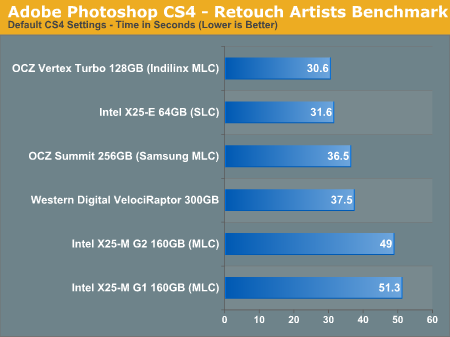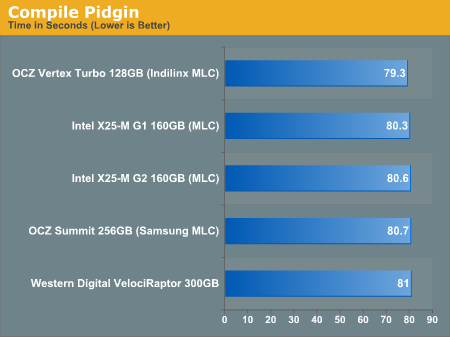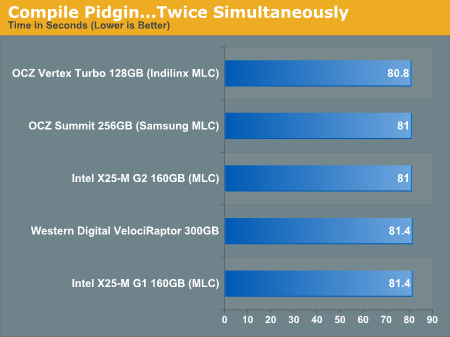The SSD Relapse: Understanding and Choosing the Best SSD
by Anand Lal Shimpi on August 30, 2009 12:00 AM EST- Posted in
- Storage
Individual Application Performance
PCMark Vantage does a great job of summarizing system performance, but I thought I'd pick a couple of applications to showcase real world strengths/weaknesses of these drives.
The first test is our Photoshop CS4 benchmark by the Retouch Artists. I made one small change to the way this test is run however. Normally I set the number of history states in Photoshop to 1, this significantly reduces the impact of the HDD/SSD on the test and makes it a better measure of CPU/memory speed. Since this is an SSD article, I've left the setting at its default value of 20. The numbers are now a lot lower and the performance a lot more disk bound.

I didn't run all of the drives through this test, just one from each major controller. The results speak for themselves. The Indilinx drives are actually the fastest MLC drives here. Even the Samsung is faster than the Intel drives in this test. Why? Sequential write speed. Even the VelociRaptor has a higher sequential write speed than the X25-M. So while sequential write speed isn't the most important metric to look at when evaluating an SSD, there are real world situations where it does matter.
Intel's performance here is just embarassing. Sequential write speed is something Intel needs to take more seriously in the future. Throw in any amount of random read/write operations alongside your Photoshop usage and the Intel drives would redeem themselves, but this is a very realistic snapshot of their achilles' heel.
Many of you have been asking for compiler benchmarks so I did just that. I grabbed the latest source for Pidgin (a popular IM application) and followed the developer's instructions on building it in Windows:

Nada. I thought perhaps it wasn't stressful enough so I tried building two instances in parallel:

And...nothing. It seems that building Pidgin is more CPU than IO bound, or at least its IO access isn't random enough to really benefit from an SSD. I'll keep experimenting with other compiler tests but this one appears to be a bust for SSD/HDD performance testing.










295 Comments
View All Comments
Anand Lal Shimpi - Monday, August 31, 2009 - link
I believe OCZ cut prices to distributors that day, but the retail prices will take time to fall. Once you see X25-M G2s in stock then I'd expect to see the Indilinx drives fall in price. Resellers won't give you a break unless they have to :)Take care,
Anand
bobjones32 - Monday, August 31, 2009 - link
Another great AnandTech article, thanks for the read.Just a head's-up on the 80GB X-25m Gen2 - A day before Newegg finally had them on sale, they bumped their price listing from $230 to $250. They sold at $250 for about 2 hours last Friday, went back out of stock until next week, and bumped the price again from $250 to $280.
So....plain supply vs. demand is driving the price of the G2 roughly $50 higher than it was listed at a week ago. I have a feeling that if you wait a week or two, or shop around a bit, you'll easily find them selling elsewhere for the $230 price they were originally going for.
AbRASiON - Monday, August 31, 2009 - link
Correct, Newegg has gouged the 80gb from 229 to 279 and the 160gb from 449 to 499 :(Stan Zaske - Monday, August 31, 2009 - link
Absolutely first rate article Anand and I thoroughly enjoyed reading it. Get some rest dude! LOLJaramin - Monday, August 31, 2009 - link
I'm wondering, if I were to use a low capacity SSD to install my OS on, but install my programs to a HDD for space reasons, just how much would that spoil the SSD advantage? All OS reads an writes would still be on the SSD, and the paging file would also be there. I'm very curious about the amount of degradation one would see relative to different use routines and apps.Anand Lal Shimpi - Monday, August 31, 2009 - link
Putting all of your apps (especially frequently used ones) off of your SSD would defeat the purpose of an SSD. You'd be missing out on the ultra-fast app launch times.Pick a good SSD and you won't have to worry too much about performance degradation. As long as you don't stick it into a database server :)
Take care,
Anand
swedishchef - Tuesday, September 1, 2009 - link
What if you just put your photoshop cache on a pair of Velociraptors? Would it be the same loss of benefit?I have the same question regarding uncompressed HD video work, where I need write speeds well over the Intel x25-m ( over 240Mb/s). My assumption would be that I could enjoy the fast IO and App. launch of an SSD and increase CPU performance with the SSD while keeping the files on a fast external or internal raid configuration.
Thank you again for a a brilliant Article Anand.
I have been waiting for it for a long time. Yours are the only calm words out on the net.
Grateful Geek /Also professional image creator.
creathir - Monday, August 31, 2009 - link
Great article Anand. I've been waiting for it...My only thoughts are, why can't Intel get their act together with the sequential business? Why can the others handle it, but they can't? To have such an awesome piece of hardware have such a nasty blemish is strange to me, especially on a Gen-2 product.
I suppose there is some technical reason as to why, but it needs to be addressed.
- Creathir
Anand Lal Shimpi - Monday, August 31, 2009 - link
If Intel would only let me do a deep dive on their controller I'd be able to tell you :) There's more I'd like to say but I can't yet unfortunately.Take care,
Anand
shotage - Monday, August 31, 2009 - link
Awesome article!I'm intrigued with the cap on the sequential reads that Intel has on the G2 drives as well. I always thought it was strange to see even on their first gen stuff.
I'm assuming that this cap might be in place to somehow ensure the excellent performance they are giving with random read/writes. All until TRIM finally shows up and you'll have to write up another full on review (which I eagerly await!).
I can't wait to see what 2010 brings to the table. What with the next version of SATA and TRIM just over the horizon, I could finally get the kind of performance out of my PC that I want!!